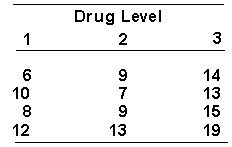Multiple Choice
An investigator conducts an experiment involving the effects of three levels of a drug on memory. Subjects are randomly assigned to one of three conditions. A different drug level is administered in each condition. Memory is measured 10 minutes after each subject receives the drug. The following scores are recorded. The higher the score, the better the memory.  Assume you are doing planned comparisons evaluating drug levels 2 and 3 using a = 0.05 and H 1 is nondirectional. What is your conclusion?
Assume you are doing planned comparisons evaluating drug levels 2 and 3 using a = 0.05 and H 1 is nondirectional. What is your conclusion?
A) accept H 0 ; the drug has the same effect at these levels
B) retain H 0 ; we cannot conclude the drug has a different effect at these levels
C) reject H 0 ; the groups are not significantly different
D) reject H 0 ; the drug has different effects at these levels
Correct Answer:

Verified
Correct Answer:
Verified
Q169: The null hypothesis in the analysis of
Q170: An ANOVA can only be used when
Q171: The alternative hypothesis evaluated by F <sub>obt</sub>
Q172: An investigator conducts an experiment involving the
Q173: What is the value of ΣS<sub>total</sub> if
Q175: The Scheffé test controls for dong multiple
Q176: Variance ratio is the statistic underlying the
Q177: A value of - 1.0 for F
Q178: It is possible to have an overall
Q179: Using <sup>2</sup>, what is the estimated size